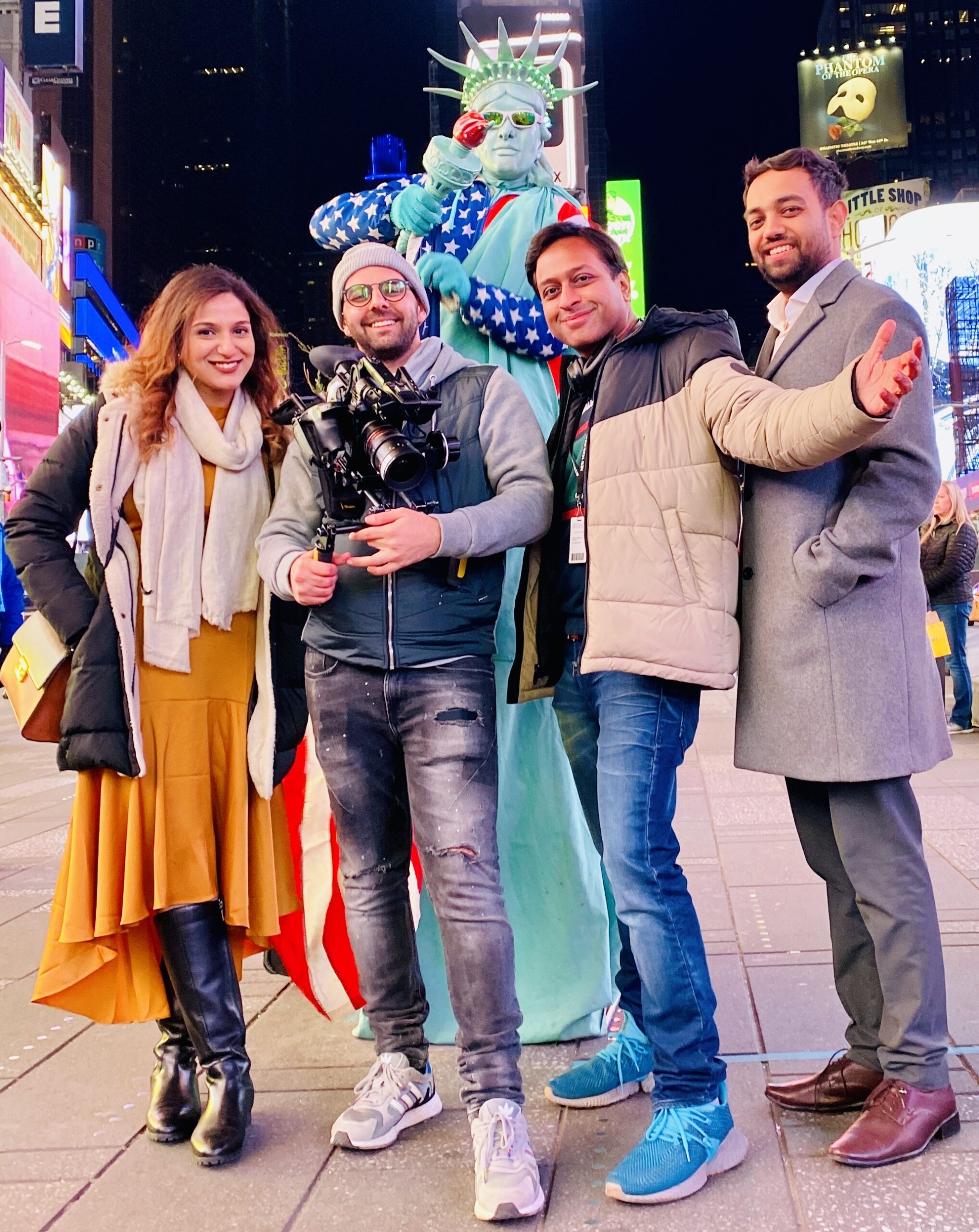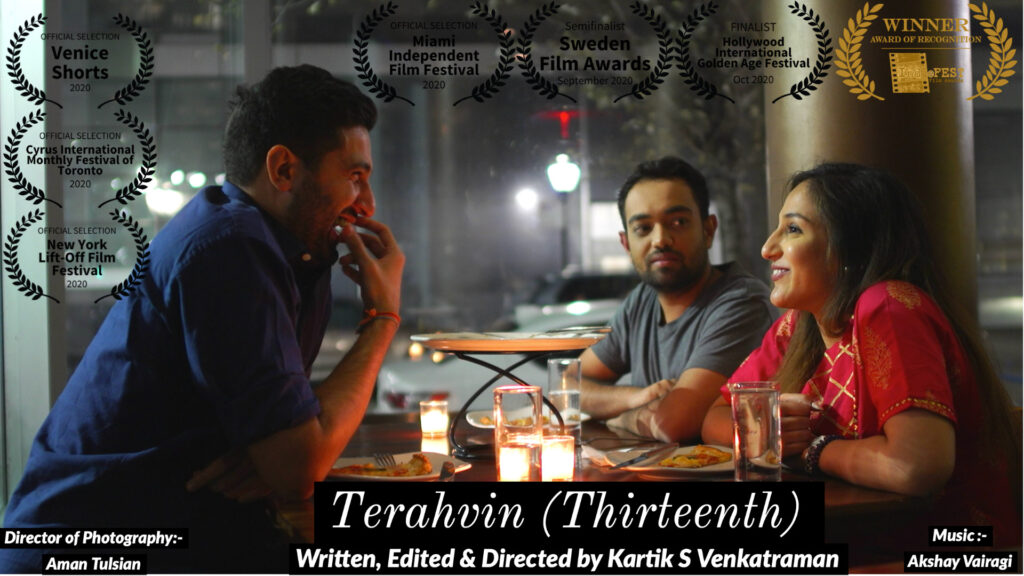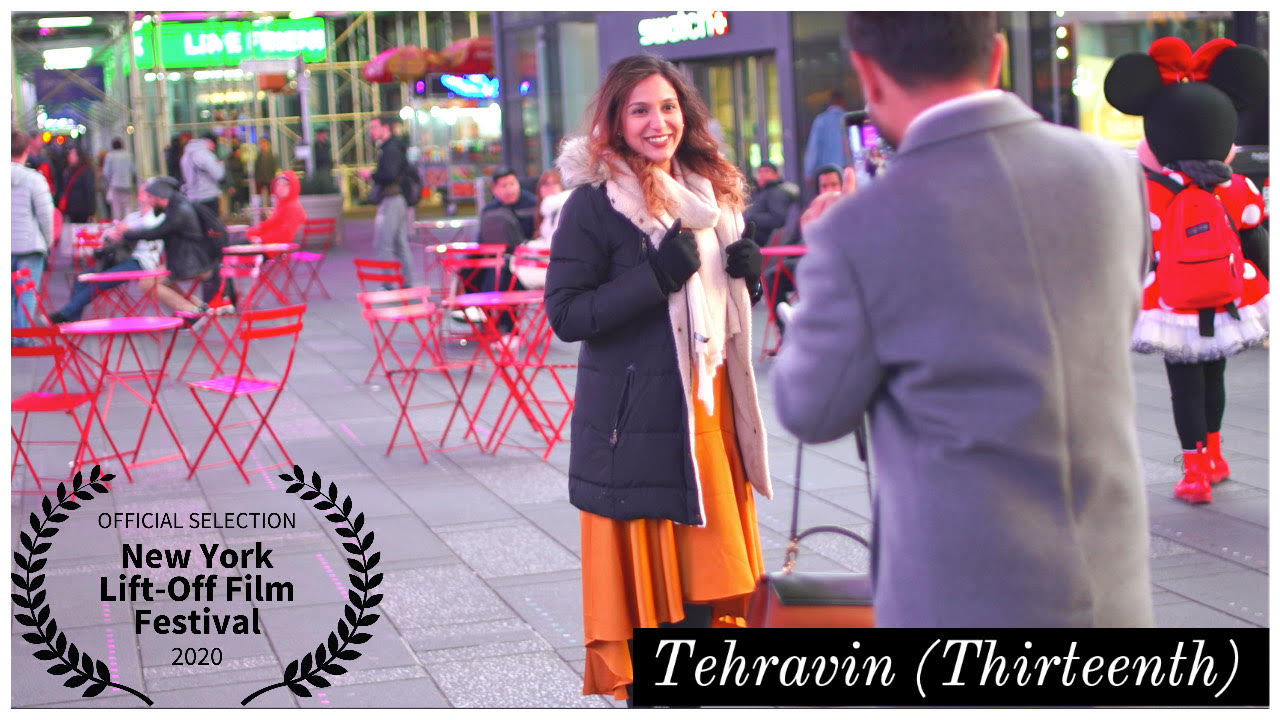It was not too long ago when the New York Film Academy (NYFA) Filmmaking student Kartik Venkatraman decided to quit his day job in India and start a new career in filmmaking in the U.S. Now, his drive for storytelling and the decision to follow his dreams seems to be paying off with his film Tehravin already receiving festival buzz from the likes of New York Lift-Off Festival and the IndieFEST Film Awards.

NYFA was able to connect with the filmmaker and discuss his journey from Mumbai to the U.S, his upcoming film Tehravin, and the challenges he faced while shooting at the beginning of a global pandemic.
New York Film Academy (NYFA): So tell us a bit more about yourself and how you came to be a filmmaker!
Kartik Venkatraman (KV): I was born and brought up in Mumbai, India and raised in a middle class household. When all kids would go out to play during their summer vacation, I would make my own stories, convert them into a three hour screenplay, and act them out alone and sometimes with my friends. However, as I grew into an adult, I followed the traditional path of completing my education and taking up a day job, but the creative kid in me was still alive and I could not stop thinking of story ideas and converting them into screenplays.
I would narrate the stories to my wife and my best friends and would usually get positive feedback for them. I ended up writing screenplays for two feature films. Once I wrote them, I wanted to give life to the screenplays and did a six month course in filmmaking, all while keeping my day job. I finally began to realize that I had it in me to become a filmmaker and tell my stories visually, and I couldn’t do so without proper training if. I finally made the bold decision to leave a well-paid job that I did not enjoy and follow my dreams. I was supported by my wife, who also encouraged me to take this opportunity as she believed in me. I did a lot of research and came to the conclusion that New York Film Academy (NYFA) would be best suited to help me enhance my skills as a filmmaker and thus I started my journey into the filmmaking world by moving to the U.S and joining NYFA.
NYFA: Can you tell us more about your film Tehravin?
KV: Per Hindu rites, 13 days is a grieving period which helps in healing the pain of the loss of a loved one. Tehravin (Thirteenth in English) is about a man who follows this ritual to help himself come out of the pain of the death of a relationship. While doing so, he reflects back on his past and the good and the not-so-good memories of the person he lost. His struggle eventually pays off as he emerges stronger and sees the light at the end of this dark period.
NYFA: Where did you shoot Tehravin and what was that process like for you?
KV: I shot Tehravin over the course of five days in New York City and New Jersey. I had a few challenges while shooting the film, however. My actor backed out a day before the shooting and I had to find a new actor within a few hours to make sure I completed the shoot; I was lucky that I could find one (a student who was already taking a 8 Week Acting for Film course with NYFA).
The biggest challenge was that the global COVID-19 outbreak had become an official global pandemic a couple of days after we started shooting (I started shooting on March 8, 2020). I had three days of shooting left and was worried if I would be able to complete it, but my crew and my actors stuck with me and we made sure we completed the shooting in between the pandemic safely.
It was my first major short movie (I had made a few class assignments before) and I believe the fact that I finished shooting it was the most satisfying part, especially considering the challenges.
NYFA: As writer, director, and producer for this film, what are you hoping the audience will understand or perhaps empathize with after watching Tehravin?
KV: The pain of the end of a relationship is akin to the death of a person. If we mourn the death of a relationship like we would mourn the death of a person, we should have the ability to emerge a stronger person at the end of the mourning period.
The film also has no dialogue and is reliant on visuals and background music to tell my story. I hope the audience is able to relate to the pain of the protagonist and also learn that there is always light at the end of the tunnel, you just need to work your way towards it. There are some subtle nuances that I’ve tried to bring out through the visuals and the acting, and I hope the audience is able to get them.
NYFA: Can you tell us more about the New York Lift-Off Film Festival?
KV: The Lift-Off Global Network is an organization encompassing worldwide live screening events, distribution initiatives, a seasonal awards ceremony, and an ever growing and active Network of indie film creators.
The Lift-Off Season Awards is an annual event which celebrates the very best of indie film. Following each Lift-Off film festival, films which have excelled in their respective category are nominated and invited to attend the prestigious Lift-Off Season Awards, culminating at the end of the Lift-Off season.
Each year the Lift-Off Global Network of film festivals screen hundreds of incredible films from a diverse range of artists with huge talent that deserves recognition. Throughout the year, they aim to discover and publicize the very best of this pool of talent and give those filmmakers the recognition they deserve.
In addition to being selected for the New York Lift-Off Film Festival, I also recently got selected for the IndieFEST Film Awards.
NYFA: Do you have any other projects in the works?
KV: I am currently working on my thesis film. It is, once again, a very sensitive film and is about child labour and helping poor children have access to education. I have locked my screenplay and look book for the film. I would start shooting it once we are out of quarantine and are allowed to shoot again as I would like to shoot the film in India.
NYFA: What are some personal elements that you like to include in your stories as a filmmaker?
KV: Most of my stories are about sensitive topics and about human connection. The thing that attracts me most about an idea is the “what if” part. For example: What if a person who has recently gone through a divorce treats the end of a relationship like he would treat a death?
I like to take an existing concept and apply a twist to it, and then keep the audience unaware of the twist until the very end. Like I did with Tehravin– it starts with a person mourning a death. All throughout the film, the audience believes that the protagonist is mourning the death of a person and it is only in the end we realize that he was actually mourning the death of his relationship with that person.
I also like to have subtle nuances in my film and not explain everything to the audience.
NYFA: Do you have any advice to any incoming NYFA students?
KV: Believe in yourself and never stop dreaming and believing that anything is possible. Make sure you go out of your way to give life to your movie. A movie is like a child. It starts with an idea and then converting that idea to a story then a screenplay, and it does not end with the production and post production. You need to market your film, find a distributor, send it to film festivals, and make sure it gets all the visibility it needs. I did all of that with Tehravin and was lucky to find an audience who understood and related to my movie.
***UPDATE August 6, 2020 – Kartik Venkatraman won the Film Short (Student) Award at the IndieFest Film Awards.


